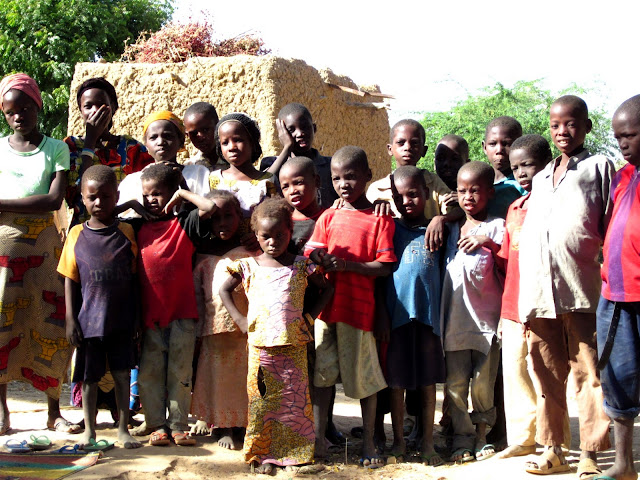Threshing millet, first by beating it with a wooden pestle on the hardened ground, and then by pouring it from a calabash at shoulder height to one on the ground, which allows the wind to blow away the chaff. This is a job usually performed by adolescent girls and young women. Millet is the staple grain of Niger.
Wednesday, December 1, 2010
December, 2010 - Niger
Threshing millet, first by beating it with a wooden pestle on the hardened ground, and then by pouring it from a calabash at shoulder height to one on the ground, which allows the wind to blow away the chaff. This is a job usually performed by adolescent girls and young women. Millet is the staple grain of Niger.
Monday, November 1, 2010
NOVEMBER, 2010

(Above) The female ward of a rural Presbyterian Church of Nigeria hospital. This hospital continues to treat leprosy patients, even though the Nigerian government denies that leprosy is still present in the country.

(Above) A Presbyterian Church of Nigeria congregation, in a neighborhood of Lagos that is now flooded. The church has stayed put, despite the harsh conditions it faces. The youth come early every Sunday to pump out the water and mops the floors clean.

(Above and below) Two Presbyterian Church of Nigeria congregations in Lagos, which are slated to be torn down due to a road widening project.

Wednesday, October 13, 2010
The EP Church, Ghana Micro Credit and Savings Scheme
Thursday, May 13, 2010
Witches, Demons, Ancestral Curses
One of the things that constantly surprises me about Ghana is the degree to which -- despite being such an open, friendly, and hospitable country -- people are convinced others are out to do them harm. It’s not a physical harm, necessary, that people worry about, but a spiritual harm that leads to the physical.
While having a conversation about this, one Ghanaian friend alluded to Matthew 11:28 (NRSV): “Do not fear those who kill the body but cannot kill the soul; rather fear him who can destroy both soul and body in hell.” It comes down to a basic question, who is the ‘him’ that Jesus is talking about, and how is that ‘he’ manifested in this world?
There’s a special preoccupation in
Another person told me to look at Exodus 20:5, the latter half of the second commandment: “I the LORD your God am a jealous God, punishing children for the iniquity of parents, to the third and the fourth generation of those who reject me, but showing steadfast love to the thousandth generation of those who love me and keep my commandments.”
I’ve heard people tell me words to the effect of, ‘My grandparents worshipped idols, and I’m only the second generation after them, so God is still punishing me. I’m doing everything in my power to break their curse upon me.’
Rather than building up families and communities, this way of thinking and being Christian can be quite destructive.
Earlier this year, at the national pastors convention of Presbyterian Church of Ghana, one well-known Presbyterian catechist had the pastors up on their feet for more than 30 minutes, praying with a charismatic fervor for God to cleanse their congregations of witches who “had the upper hand” over them.
Listen to a short recording from the conference
I was overwhelmed at the time, how my understanding of the Gospel of Jesus Christ was so profoundly different from theirs.
Sometimes, the charismatic movement in this country can be wonderful, the way it adds life and vitality to the community. But it has its serious problems as well. And in my opinion, the problems are beginning to outweigh the benefits.
Charismatic prayers have begun to focus almost exclusively on three things:
- an increase in personal power and authority,
- financial prosperity and the claiming of one’s rightful inheritance from God,
- the destruction of one’s enemies, including witches, demons, and evil spirits.
I long for the day when I hear a congregation, with a charismatic fervor, praying for peace in the world, a resolution to hostility within family and community, justice for the oppressed, and a call to end poverty.
Thursday, April 22, 2010
Palm Sunday 2010, in Nima, Accra, Ghana
Wednesday, February 24, 2010
My Ghanaian Home























